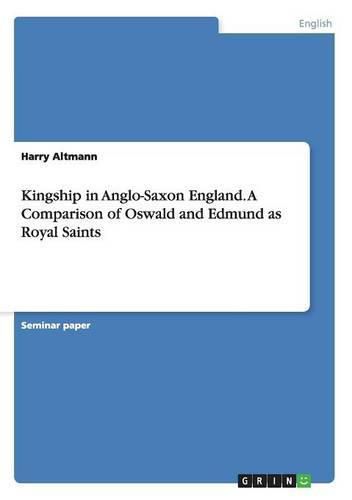Readings Newsletter
Become a Readings Member to make your shopping experience even easier.
Sign in or sign up for free!
You’re not far away from qualifying for FREE standard shipping within Australia
You’ve qualified for FREE standard shipping within Australia
The cart is loading…






Seminar paper from the year 2013 in the subject English Language and Literature Studies - Culture and Applied Geography, University of Munster (Anglistik), language: English, abstract: The basic form of society in Anglo-Saxon England was a kingdom. Over the centuries the movement was away from many small units to larger kingdoms controlling greater populations. The first kings were pagan and when Christianity became established the Christian kings kept many of the characteristics of their pagan forebears. The Christian kings continued to be primarily military leaders. A cult of martyrs arose in Anglo-Saxon England which included Christian kings who had died either in battle or in defence of Christianity. Other royal saints followed a different path to sainthood by leading exemplary Christian lives. Many saints’ lives composed in Latin circulated in Anglo-Saxon England but it was the monk and author AElfric of Eynsham who translated a collection of saints’ lives into Old English. In particular this paper will deal with the lives of St Edmund and St Oswald. After a brief introduction to the lives of these two saints an analysis of the two concepts of vita and passio follows. Then the general and syntactic linguistic structure of both texts is examined. Finally a comparison of the deaths of St Oswald and St Edmund illustrates the difference in approach of these writings.
$9.00 standard shipping within Australia
FREE standard shipping within Australia for orders over $100.00
Express & International shipping calculated at checkout
Seminar paper from the year 2013 in the subject English Language and Literature Studies - Culture and Applied Geography, University of Munster (Anglistik), language: English, abstract: The basic form of society in Anglo-Saxon England was a kingdom. Over the centuries the movement was away from many small units to larger kingdoms controlling greater populations. The first kings were pagan and when Christianity became established the Christian kings kept many of the characteristics of their pagan forebears. The Christian kings continued to be primarily military leaders. A cult of martyrs arose in Anglo-Saxon England which included Christian kings who had died either in battle or in defence of Christianity. Other royal saints followed a different path to sainthood by leading exemplary Christian lives. Many saints’ lives composed in Latin circulated in Anglo-Saxon England but it was the monk and author AElfric of Eynsham who translated a collection of saints’ lives into Old English. In particular this paper will deal with the lives of St Edmund and St Oswald. After a brief introduction to the lives of these two saints an analysis of the two concepts of vita and passio follows. Then the general and syntactic linguistic structure of both texts is examined. Finally a comparison of the deaths of St Oswald and St Edmund illustrates the difference in approach of these writings.